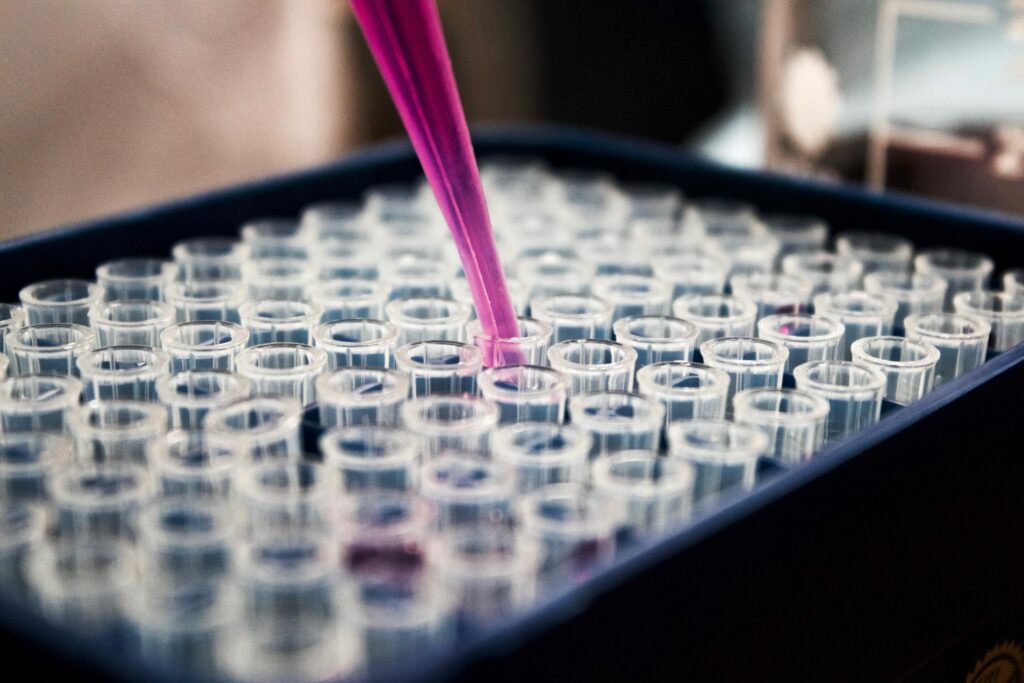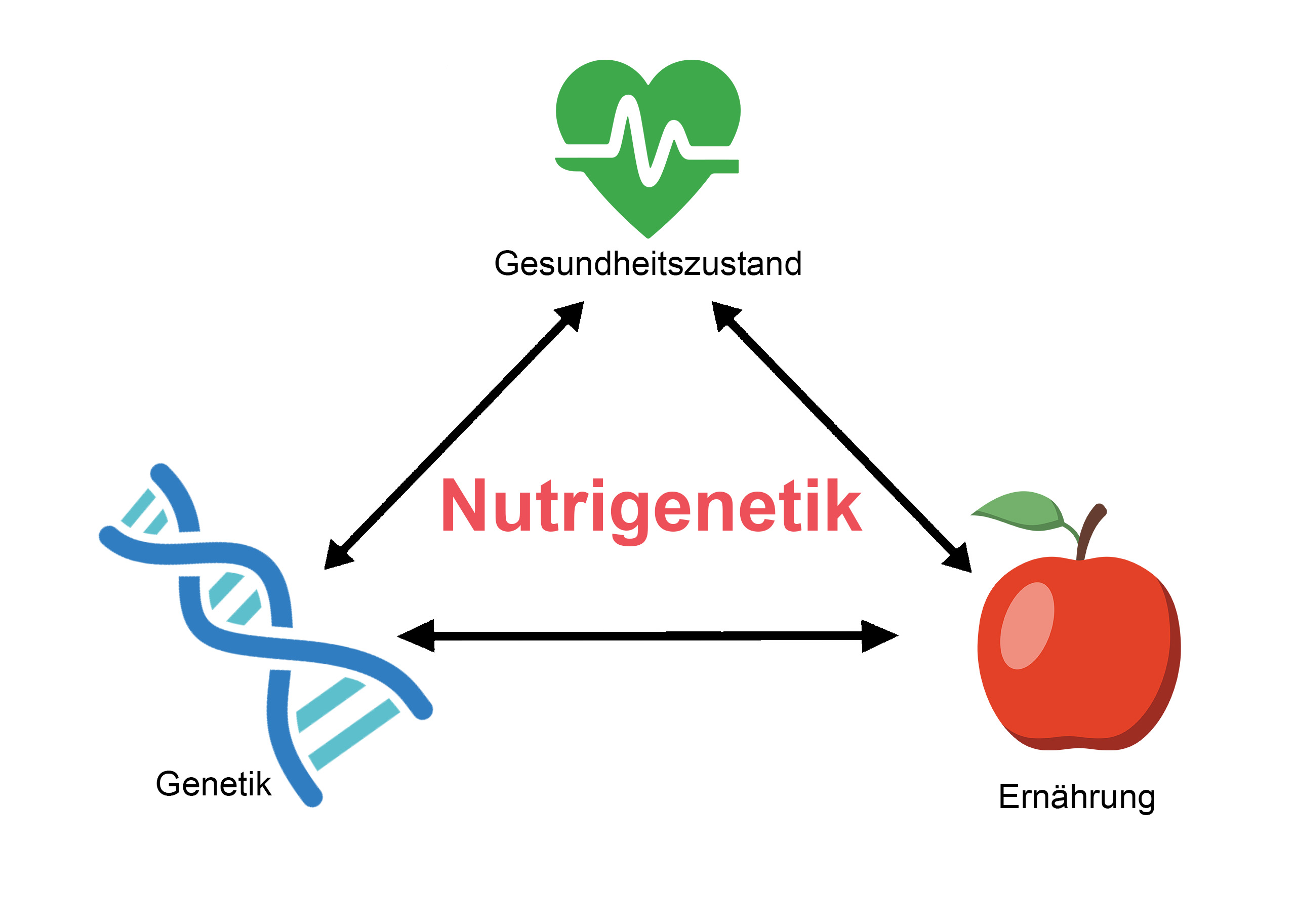Genetic test diet – lose weight with a DNA test?
Odemshop
AuthorPlanning and discipline are often not enough for long-term weight loss. Genes also play a decisive role in body metabolism. Although the human genome is largely identical, polymorphisms provide the individual genetic fingerprint. Diese Genvariationen beeinflussen auch den Stoffwechsel. Auf dieser Basis wurden DNA-Tests entwickelt, um stoffwechselspezifischer Genvarianten bestimmen und eine individuelle Diät zu entwerfen. […]

Planning and discipline are often not enough for long-term weight loss. Genes also play a decisive role in body metabolism. Although the human genome is largely identical, polymorphisms provide the individual genetic fingerprint.
Diese Genvariationen beeinflussen auch den Stoffwechsel. Auf dieser Basis wurden DNA-Tests entwickelt, um stoffwechselspezifischer Genvarianten bestimmen und eine individuelle Diät zu entwerfen. Aber was genau messen diese Stoffwechseltests und was bringen sie?
These gene variations also influence metabolism. On this basis, DNA tests have been developed to determine metabolism-specific gene variants and to design an individual diet. But what exactly do these metabolic tests measure, and what are their benefits?
The DNA and the metabolism
Every human cell contains the entire genetic material. These 20,000 to 25,000 genes are arranged on DNA threads almost two meters long, which, together with the base pairs, form the double helix. This is densely packed in the cell nucleus. The genes contain blueprints for all body proteins, which the body can read and decode as needed.
The human genome is 99.7 % identical. However, some nucleic bases can vary within the approximately three billion base pairs. These spelling mistakes in the gene sequence lead to so-called polymorphisms (single nucleotide polymorphisms, SNPs, “snips”). The gene variations are mostly inherited and also determine, among other things, how the body metabolizes nutrients (1).
This means that each person processes fats, carbohydrates, and proteins differently. Based on this knowledge, DNA tests have been developed to gather nutritional information and construct specific diets.
DNA test and DNA diet: how they work
DNA tests are becoming increasingly important in screening for diseases. The research field of nutrigenetics investigates the interaction between the genome (the consequence of genetic variations) and nutrition. Among other things, decoding metabolically relevant gene sequences should make it possible to counteract diet-related diseases such as obesity (2).

In a genetic metabolic analysis (metabolic typing), various relevant SNPs are analyzed based on a saliva sample, and the individual metabolic type is determined from this. This tells us what the respective body needs and how it reacts to different influences.
Which (genetic) factors can influence weight loss?
Genetic factors have long been known to promote the development of obesity (1.3). More than 40 aberrant genes (candidate genes) have now been identified. Here is an overview of some of these candidate genes (3):
| Gen | Funktion |
| ADCY3 | Influences energy balance and MC4R. |
| APOA2 | Response to saturated fat; affects the transport of LDL cholesterol. |
| BDNF | The nerve growth factor family protein; regulates the survival/differentiation of some neurons. |
| FTO | Response to carbohydrates; involved in the development of obesity; promotes an increase in fat white cells. |
| LEP | It influences overweight risk, circulates in proportion to fat mass, and regulates body weight. |
| LEPR | Activates the satiety hormone leptin. |
| MC4R | Regulates energy balance. |
| PCSK1 | Influences obesity risk; regulates insulin synthesis. |
Legende: ADCY3, Adenylatcyclase 3; APOA2, Apolipoprotein A2; BDNF, Brain.derived neurotrophic Factor; FTO, Fat Mass and Obesity Gene; LEP, Leptin; LEPR, Leptinrezeptor; MC4R, Melanocortin-4-Rezeptor; PCSK1, Proprotein-Convertase 1.
The best-researched candidate gene encodes the blueprint for the Melanocortin-4 receptor (MC4R). This influences the energy balance and regulates body weight. If it deviates from the norm, it can lead to severe overweight in childhood and adolescence (4).
The Fat Mass and Obesity (FTO) gene, in turn, causes a significantly reduced feeling of satiety and can promote weight gain. Individuals are assigned to different metabolic types based on analyzing several candidate genes. These reveal which foods facilitate weight loss.
In addition to genetic tests, blood tests for food are also available. However, these determine the tolerance or intolerance of certain foods and are not primarily used for weight reduction.
DNA tests for weight loss
The market with DNA tests is an emerging one. Among others, the following DNA test for weight loss is available:
| Hersteller | Produkt | Analyse | Auswertungsdauer |
|---|---|---|---|
| Lykon | DNA Slim Test | 23 Basenpaare in 19 Genen. Ermittlung des Stoffwechseltyps, Bestimmung von Hunger- und Sättigungsgefühl, Neigung zu Übergewicht, Jo-Jo-Effekt, Eignung für bestimmte Diäten (Kalorienreduktion, mediterrane Diät) | Bis zu 30 Tage |
| CoGAP | MetaCheck Gentest | Meta-Typ-Bestimmung, Makronährstoffempfehlung für Abnehm- und Stabilisierungsphase, Identifikation von 5 Abnehmfaktoren, Lebensmittelliste mit über bewerteten 800 Lebensmitteln, Sport-Typ-Bestimmung, individuelle Trainingsempfehlung | 14 Tage |
| DNA for ME | My Weight | 8 Gene, Bestimmung der genetischen Eigenschaften (Fett- und Kohlenhydratverwertung, Jo-Jo-Effekt, Snack-Typ etc.), Bewertung von 900 Lebensmitteln zum Abnehmen, inkl. Trainingsplan und Rezeptbuch | 2–4 Wochen |
| cerascreen® | DNA Stoffwechsel Test | Bestimmung von 6 relevanten Stoffwechselgenen (FTO, PPARG, APOA2, APOA5, LEPR, ACTN3), Ermittlung von Stoffwechsel- und Sporttyp | 4–6 Wochen |
| Beyond DNA | Beyond DNA Weight | Analyse von 8 relevanten Gewichtsgenen, Bewertung von über 1.000 Lebensmitteln zum Abnehmen, Ernährungsempfehlung, Sportplan | 2–4 Wochen |
| SlimKey (CoGAP) | Slimkey Stoffwechselanalyse | 7 analysierte Stoffwechsel- und Metabolismus-Gene (SNPs), Bestimmung des Stoffwechseltyps, Tendenz zu viszeralem Fett/Jo-Jo-Effekt, Informationen zu Hunger- und Sättigungsgefühl | Ca. 2 Wochen |
| MYBODY LAB GmbH | Vitality Stoffwechselanalyse | Bestimmung rund 100 verschiedener Genabschnitte, Stoffwechsel- und Sporttyp, genetische Neigungen (Entzündungsempfindlichkeit, Schlafzyklus), Bewertung genetisch bedingter Reaktionen auf mehr als 1.000 Lebensmittel | 3–5 Wochen |
| Geneplanet | MyLifestyle DNA test | Analyse von über 80 Genabschnitten, davon 39 ernährungsrelevante (z. B. Adiponectin, Blutzuckerregulation, Fettverbrennung, Insulinsensitivität, Diättyp, Omega-3-Fettstoffwechsel, Jo-Jo-Effekt) | 5 Wochen |
Legende: FTO, fat mass and obesity gene; PPARg, Peroxisom-Proliferator-aktivierter Rezeptor gamma; APOA2, Apolipoprotein A2; APOA5, Apolipoprotein A5; LEPR, Leptinrezeptor; ACTN3, alpha-Actinin 3.
Limitations of DNA nutritional analyses
There is currently still disagreement in the scientific community as to whether metabolic testing can achieve permanent weight loss faster or better. The functions of many genes and mechanisms are still unknown, and clear scientific evidence is still lacking (5, 6).
Dennoch können Genanalysen ein probates Mittel zur Gewichtsreduktion sein, wenn sie Baustein eines Gesamtkonzeptes verstanden und unter Begleitung Fachleuten (Ernährungsmediziner, Diätassistenten, Ökotrophologen etc.) umgesetzt werden.
Nevertheless, genetic analyses can be an effective means of weight reduction if they are understood as a building block of an overall concept and implemented under the guidance of specialists (nutritionists, dieticians, ecotrophologists, etc.).
Conclusion
Permanent weight reduction is often not achievable through diets or a change in diet. By analyzing metabolism-relevant genes, one gains much information on the personal metabolic situation, the processing of macro- and micronutrients, and the ideal physical activity. A DNA test is a perfect basis for an individual diet and activity plan to achieve long-term weight loss success.
FAQ
What are the benefits of DNA testing for weight loss?
Often, regular diets do not lead to the desired weight reduction. An active metabolism is essential for weight loss success. A genetically based diet can support in achieving long-term weight loss success.
How much does a metabolic analysis cost?
The costs for genetic metabolic analysis for weight reduction vary depending on the provider and the scope of services. On average, prices of 200 to 400 euros can be expected.
How does a DNA test for weight loss work?
A saliva sample is used to analyze various gene segments relevant to metabolism. This reveals how the body metabolizes food. In this way, specific diet and exercise plans can be developed.
What is a gene-diet?
A gene diet (DNA diet, genetic metabolic analysis) is the form of a diet based on DNA analysis. Considering the individual (metabolic) genetics can contribute to weight reduction.



